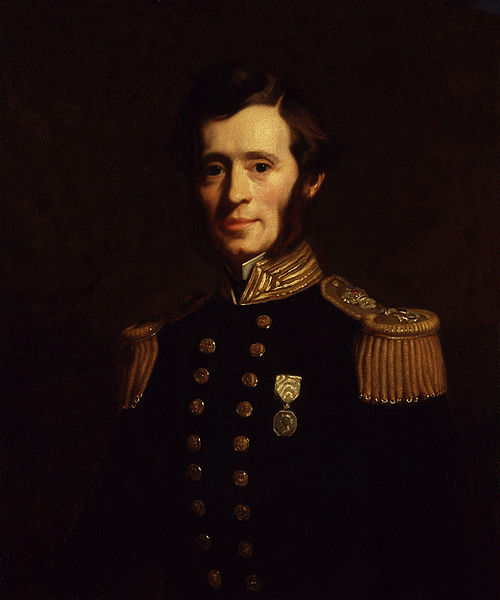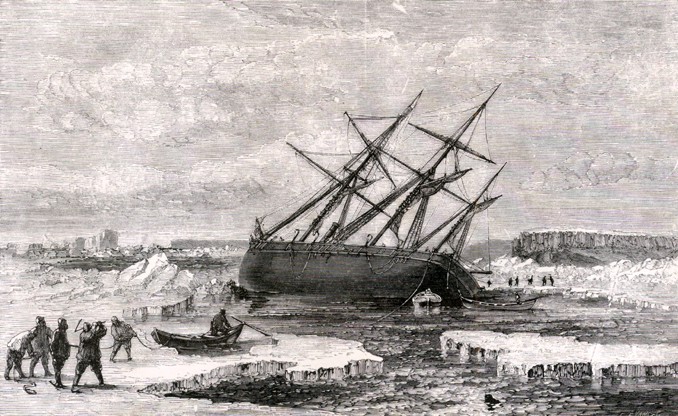<Back to Index>
- Mathematician Henri Paul Cartan, 1904
- Fabulist Jean de La Fontaine, 1621
- Rear Admiral of the Royal Navy Francis Leopold McClintock, 1819
PAGE SPONSOR

Admiral Sir Francis Leopold McClintock or Francis Leopold M'Clintock KCB (8 July 1819 – 17 November 1907) was an Irish explorer in the British Royal Navy who is known for his discoveries in the Canadian Arctic Archipelago.
He was born in Dundalk, County Louth. In 1831, he became a member of the Royal Navy as a gentleman volunteer, and joined a series of searches for Sir John Franklin between 1848 and 1859. He mastered traveling by using human hauled sleds, which remained the status quo in Royal Navy Arctic and Antarctic overland travel until the death of Captain Robert Falcon Scott RN in his forlorn hope bid to reach the South Pole. In 1848 - 49, McClintock accompanied James Clark Ross on his survey of Somerset Island. As part of Capt. Henry Kellett's expedition 1852 to 1854, McClintock traveled 1,400 miles by sled and discovered 800 miles of previously unknown coastline.
In 1857, he was given command of the yacht Fox which was sponsored by public subscription via Lady Jane Franklin's search for her missing husband, and found the only official record of the 1845 - 48 Sir John Franklin Northwest Passage Expedition, in May 1859. This time, he did use dogs. This tale was published in The Voyage of the 'Fox' in the Arctic Seas: A Narrative of the Discovery of the Fate of Sir John Franklin and His Companions, London, 1859.
McClintock left the Royal Navy in 1884 as a Rear Admiral. He died on 17 November 1907. He was buried in Kensington Cemetery, Hanwell, Middlesex.
On 29 October 2009 a special service of thanksgiving was held in the chapel at the Old Royal Naval College in Greenwich, to accompany the rededication of the national monument to Sir John Franklin there.
The service also included the solemn re-internment of the remains of
Lieutenant Henry Thomas Dundas Le Vesconte, the only remains ever
repatriated to England, entombed within the monument in 1873. The
event brought together members of the international polar community and
invited guests included polar travellers, photographers and authors and
descendants of Franklin, Captain Francis Rawdon Moira Crozier and their men, and the families of those who went to search for them, including McClintock, Rear Admiral Sir John Ross and Vice Admiral Sir Robert McClure among many others. The gala was directed by the Rev Jeremy Frost and polar historian Dr Huw Lewis-Jones and was organised by Polarworld and the High Commission of Canada to the United Kingdom.
It was a celebration of the contributions made by the United Kingdom in
the charting of the Canadian North, which honoured the loss of life in
the pursuit of geographical discovery. It also marked the 150th
anniversary of McClintock's voyage aboard the yacht Fox, returning to
London with news of the tragedy. The Navy was represented by Admiral
Nick Wilkinson, prayers were led by the Bishop of Woolwich and
among the readings were eloquent tributes from Duncan Wilson, chief
executive of the Greenwich Foundation and H.E. James Wright, the
Canadian High Commissioner. At a private drinks reception in the Painted Hall which followed this Arctic service, Chief Marine Archaeologist for Parks Canada Robert
Grenier spoke of his ongoing search for the missing expedition ships.
The following day a group of polar authors went to London's Kensal Green Cemetery to pay their respects to the Arctic explorers buried there. After
some difficulty, McClure's gravestone was located. It is hoped that his
memorial, in particular, may be conserved in the future. Many other
veterans of the searches for Franklin are buried there, including
Admiral Sir Horatio Thomas Austin, Admiral Sir George Back, Admiral Sir Edward Augustus Inglefield, Admiral Bedford Clapperton Trevelyan Pim, and Admiral Sir John Ross. Franklin's redoubtable wife Jane Griffin, Lady Franklin, is also interred at Kensal Green in the vault, and
commemorated on a marble cross dedicated to her niece Sophia Cracroft.
